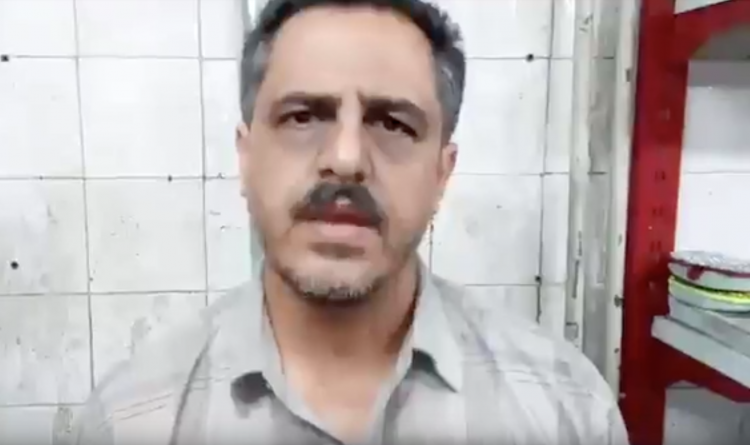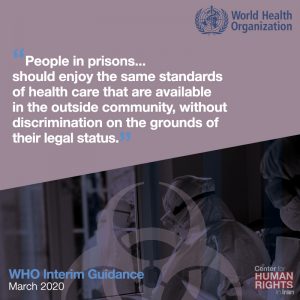Political Prisoner with COVID-19 Symptoms Denied Treatment, Transferred to Solitary Confinement
 Peaceful prisoner of conscience Mohammad Hossein Sepehri, who was imprisoned in the Iranian city of Mashhad after signing an open letter calling on Supreme Leader Ali Khamenei to resign, was denied hospital treatment and transferred to solitary confinement without his medication after exhibiting COVID-19 symptoms, his brother told the Center for Human Rights in Iran (CHRI).
Peaceful prisoner of conscience Mohammad Hossein Sepehri, who was imprisoned in the Iranian city of Mashhad after signing an open letter calling on Supreme Leader Ali Khamenei to resign, was denied hospital treatment and transferred to solitary confinement without his medication after exhibiting COVID-19 symptoms, his brother told the Center for Human Rights in Iran (CHRI).
In an interview with CHRI, Asghar Sepehri said his brother believes he contracted the virus after being transferred to a ward that holds inmates convicted of dangerous crimes in Vakilbad Prison in Mashhad.
According to Iranian law, prisoners should be held in separate wards according to the nature of their convictions. CHRI has documented instances in which peaceful political prisoners have died after being transferred to wards that hold individuals accused of violent crimes.
Upon complaining of the symptoms, Mohammad Hossein Sepehri was then transferred to a solitary confinement cell at the Intelligence Ministry’s detention center in the city.
Sepehri is among several prisoners of conscience who were excluded from previous mass prisoner releases throughout the country and who were denied testing after complaining of COVID-19 symptoms.
Following is a transcript of his brother Asghar Sepehri’s comments to CHRI during an interview on April 6:
 On April 2, 2020, those who signed the resignation request, including Mohammad Nourizad, Hashem Khastar, Abbas Vahedian, Kamal Yazdi, Abdolrasoul Mortazavi along with my brother and sister [Fatemeh Sepehri], were taken to the Intelligence Ministry’s detention center… The prosecutor claims they were moved for their own safety.
On April 2, 2020, those who signed the resignation request, including Mohammad Nourizad, Hashem Khastar, Abbas Vahedian, Kamal Yazdi, Abdolrasoul Mortazavi along with my brother and sister [Fatemeh Sepehri], were taken to the Intelligence Ministry’s detention center… The prosecutor claims they were moved for their own safety.
My brother called me and said he had contracted the coronavirus. He, along with Mr. Yazdi and Mr. Mortazavi, was transferred to a ward for dangerous convicts [in Vakilabad Prison] on March 9 and that’s where he probably got infected because he was [previously] in the ward for political prisoners and there had not been any face-to-face visitations there for a long time.
When he was returned to the political wing on March 28, he noticed signs of the coronavirus. He said he had a fever, shivers, dry cough and diarrhea. Naturally, he should have been taken to the hospital to get tested for the virus, but he was instead transferred to the Intelligence Ministry’s detention center where the resident doctor ordered him to be held in a solitary cell that has no window without any medical attention. We believe that the judiciary is using this disease as a means to torture political prisoners. There’s no other explanation for their behavior.
As soon as the Islamic Republic acknowledged the existence of the virus, our family made efforts to free my brother and sister on bail but failed. Now we are very worried for our brother and want him to be tested for the coronavirus. He and my sister should be granted furlough, but the authorities are not consenting. They are giving us the runaround and refuse to answer our questions.
The judge told us that he could not do anything and referred us to the Appeals Court, but nobody is responding to our inquiries over there. Their reaction tells us that they have no intention of freeing them.
Mohammad Hossein Sepehri is one of 14 peaceful political and civil rights activists who signed a letter in June 2019 criticizing Khamenei’s leadership of the country and demanding he step down.
“The time has come for the people, thinkers, and caring individuals to lead a national movement by setting aside conciliatory tendencies that have facilitated the destruction of our culture, civilization and national wealth and with all honesty step into the ring and demand fundamental changes to the Constitution and the resignation of the leader who is unjustly extending his authority on a daily basis,” the letter stated.
On March 31, 2020, the Appeals Court in Khorasan Razavi Province upheld a six-year prison sentence against Sepehri and reduced his sister’s sentence from six years to three years and six months. For signing the letter, the two were convicted of “forming an illegal organization” against the country’s security and “propaganda against the state.”
In his latest report presented to the Human Rights Council, Javaid Rehman, the UN Special Rapporteur on the situation of human rights in the Islamic Republic of Iran, said he was seriously concerned about “overcrowding, poor nutrition and a lack of hygiene” in Iran’s prisons and at a recent press briefing called for all political prisoners to be released to protect them from COVID-19.
In March 2020, the World Health Organization (WHO) released an interim guidance on how to prevent and control the spread of COVID-19 in prisons and other places of detention. CHRI has translated the document into Persian and reiterates its call on Iranian authorities to release all individuals who should not be in prison in the first place including peaceful political prisoners and dual nationals.
According to the WHO, “Efforts to control COVID-19 in the community are likely to fail if strong infection prevention and control (IPC) measures, adequate testing, treatment and care are not carried out in prisons and other places of detention as well.”
Read this article in Persian.






